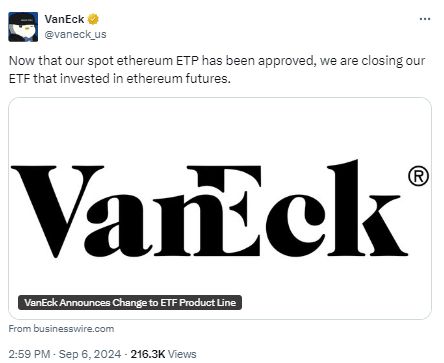In a significant development for the cryptocurrency investment landscape, global asset manager VanEck has announced its decision to close and liquidate its Ethereum futures-based exchange-traded fund (ETF), the VanEck Ethereum Strategy ETF (EFUT). This move, revealed in a September 6, 2024 announcement, marks a shift in the company’s strategy as the demand for futures-based crypto ETFs dwindles, while spot cryptocurrency ETFs continue to dominate inflows.
The decision to dissolve the EFUT ETF was approved by the Board of Trustees of VanEck ETF Trust on September 5, 2024. The closure reflects broader trends in the investment market, as interest in futures-based products diminishes and investors increasingly gravitate toward spot-based ETFs that provide more direct exposure to cryptocurrencies like Bitcoin and Ethereum.

VanEck Ethereum Strategy ETF (EFUT)
Launched as a futures-based product, the VanEck Ethereum Strategy ETF (EFUT) aimed to offer investors exposure to Ethereum by investing in futures contracts, rather than holding the underlying cryptocurrency itself. Futures contracts are agreements to buy or sell an asset at a predetermined price at a specified time in the future. While futures contracts allow investors to speculate on the price movement of assets, they do not provide the same level of direct ownership as spot-based investments, which involve holding the actual asset.
The VanEck Ethereum Strategy ETF was part of the firm’s broader effort to provide investors with a way to gain exposure to Ethereum through a regulated and easily accessible financial product. However, despite initial optimism, the fund struggled to gain significant traction in the market. Low demand and limited investor interest ultimately led VanEck to make the difficult decision to close the fund.
Why Futures-Based ETFs Struggled to Attract Investors
Futures-based ETFs, particularly in the cryptocurrency space, have faced several challenges that have hindered their ability to attract significant investor interest. One of the main issues is the inherent complexity of futures contracts, which can be difficult for average investors to understand and navigate. Unlike spot ETFs, which offer straightforward ownership of the underlying asset, futures-based ETFs involve the purchase of contracts that are subject to expiration and rollover costs. These factors can result in performance that differs from the actual price movements of the underlying cryptocurrency, making futures-based ETFs less appealing to certain investors.
Additionally, futures-based ETFs are often subject to contango, a situation where the futures price of an asset is higher than its spot price. When a futures-based ETF rolls its contracts forward, it may end up purchasing new contracts at a higher price than the expiring ones, leading to diminished returns. This structural issue has made some investors wary of futures-based products, particularly when there are spot-based alternatives available that provide more direct exposure to the underlying asset.
In the case of the VanEck Ethereum Strategy ETF, these challenges, combined with growing competition from spot crypto ETFs, likely contributed to the fund’s low demand and eventual closure.
The Rise of Spot Crypto ETFs
While futures-based ETFs have struggled to gain traction, spot crypto ETFs have become increasingly popular among investors seeking exposure to the burgeoning cryptocurrency market. Spot ETFs, which directly hold the underlying cryptocurrency, offer a simpler and more transparent way for investors to gain exposure to assets like Bitcoin and Ethereum. These products have surged in popularity, leading the way in terms of inflows and capturing the attention of both retail and institutional investors.
The launch of spot Bitcoin ETFs in various markets, including Canada and Europe, has been met with overwhelming demand, highlighting the growing appetite for cryptocurrency exposure in traditional investment vehicles. These ETFs provide investors with direct ownership of the underlying asset, eliminating the complexities associated with futures contracts and offering more accurate price tracking.
As spot crypto ETFs continue to dominate inflows, they have emerged as the preferred choice for investors looking to participate in the cryptocurrency market without the need to directly buy and store digital assets. The simplicity, transparency, and lower costs associated with spot ETFs have made them a more attractive option for both novice and experienced investors alike.
VanEck’s Strategic Shift
VanEck’s decision to close the Ethereum futures ETF reflects a broader trend in the asset management industry, where firms are reassessing their strategies in response to shifting investor preferences. With demand for futures-based products declining and spot crypto ETFs capturing the lion’s share of inflows, VanEck appears to be positioning itself to focus on more promising areas of the cryptocurrency market.
Despite the closure of the VanEck Ethereum Strategy ETF, VanEck remains committed to offering innovative investment solutions in the cryptocurrency space. The firm continues to explore opportunities to launch spot-based cryptocurrency ETFs, pending regulatory approval. VanEck’s existing suite of digital asset products includes a spot Bitcoin ETF and other offerings that cater to the growing demand for direct cryptocurrency exposure.
The closure of the Ethereum futures ETF may also signal a broader pivot within the industry, as asset managers recognize the limitations of futures-based products and focus on delivering more user-friendly and accessible investment options. As the regulatory landscape evolves and more jurisdictions approve spot crypto ETFs, it is likely that the demand for these products will continue to grow, further reducing the appeal of futures-based alternatives.
Regulatory Considerations and the Future of Crypto ETFs
The closure of the VanEck Ethereum Strategy ETF highlights the ongoing challenges and opportunities in the cryptocurrency ETF space. While spot crypto ETFs have gained significant traction in markets like Canada and Europe, the U.S. Securities and Exchange Commission (SEC) has remained cautious in approving spot-based cryptocurrency ETFs, particularly for Ethereum and other altcoins.
The SEC has raised concerns about market manipulation, liquidity, and investor protection in the cryptocurrency space, which has delayed the approval of spot crypto ETFs in the U.S. market. However, industry stakeholders remain optimistic that regulatory clarity will eventually pave the way for the launch of spot-based ETFs in the U.S., unlocking new opportunities for both investors and asset managers.
In the meantime, asset managers like VanEck are navigating the regulatory environment by launching futures-based products, which have been approved by the SEC. However, as demonstrated by the closure of the VanEck Ethereum Strategy ETF, futures-based ETFs may not be the long-term solution that investors are seeking. The market is clearly signaling a preference for spot-based products, which offer more direct exposure to the underlying assets and align more closely with investor expectations.
The Impact on Investors and the Crypto Market
The decision to close the VanEck Ethereum Strategy ETF serves as a reminder that the cryptocurrency investment landscape is still evolving, and investors need to stay informed about the products they choose to invest in. For investors who had exposure to the VanEck Ethereum Strategy ETF, the closure of the fund means that their investments will be liquidated, and they will receive the proceeds from the sale of the fund’s assets.
While the closure of a futures-based ETF may seem like a setback for the broader crypto investment market, it also underscores the rapid pace of innovation and the growing demand for more efficient, transparent, and accessible investment products. The rise of spot crypto ETFs reflects a broader trend toward the mainstream adoption of digital assets, as more investors seek exposure to cryptocurrencies through regulated and familiar financial instruments.
For the cryptocurrency market as a whole, the shift away from futures-based products and toward spot ETFs could lead to increased liquidity, price stability, and investor confidence. As more spot crypto ETFs become available in global markets, they have the potential to attract a wider range of investors, including those who may have been hesitant to invest in the cryptocurrency market due to concerns about volatility and complexity.
Conclusion
The closure of VanEck’s Ethereum futures ETF marks an important moment in the ongoing evolution of the cryptocurrency investment market. While futures-based products were once seen as a key way to gain exposure to cryptocurrencies, the rise of spot crypto ETFs has changed the game, offering investors a more direct, transparent, and user-friendly option for participating in the digital asset space.
VanEck’s decision to pivot away from futures-based products and focus on more promising areas of the market reflects a broader shift in investor preferences and market dynamics.
Personal Note From MEXC Team
Check out our MEXC trading page and find out what we have to offer! There are also a ton of interesting articles to get you up to speed with the crypto world. Lastly, join our MEXC Creators project and share your opinion about everything crypto! Happy trading! Learn about interoperability now!
Join MEXC and Get up to $10,000 Bonus!
Sign Up


